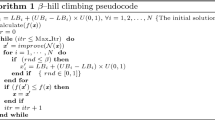Abstract
In this paper we describe a new student registration system which has been developed at the University of Valencia, Spain. The system has two steps. First, the students make a computer-aided course selection from the courses available at the University. Thereafter, an assignment procedure allocates students to sections in order to respect two criteria: to provide the students with satisfactory schedules and to get balanced section enrollments.
The assignment process has two phases. In Phase I, we obtain a set of the best solutions for each student. The algorithm is based on the construction of maximum cardinality independent sets. In Phase II, these solution sets are put together and a tabu search algorithm looks for a satisfactory balance between course sections without causing the solution obtained for each student to worsen significantly.
The system was used at the beginning of the academic year 1996/97 in the Faculty of Mathematics and could be extended in the near future to the rest of the University.
Similar content being viewed by others
Explore related subjects
Discover the latest articles and news from researchers in related subjects, suggested using machine learning.References
C. Bron and J. Kerbosh, Algorithm 457–finding all cliques of an undirected graph, Comm. of ACM 16 (1973) 575–577.
E. Burke, K. Jackson, J.H. Kingston and R. Weare, Automated university timetabling: the state of the art, The Computer Journal 40 (1997) 565–571.
V.A. Busam, An algorithm for class scheduling with section preferences, Comm. of ACM 10 (1967) 567–569.
M.W. Carter and G. Laporte, Recent developments in practical course timetabling, in: Practice and Theory of Automated Timetabling II, eds. E. Burke and M. Carter (Springer, Berlin, 1998) pp. 3–19.
A. Colijn, A sectioning algorithm, INFOR 11 (1973) 210–225.
M. Gendreau, A. Hertz and G. Laporte, A tabu search algorithm for the vehicle routing problem, Management Science 40 (1994) 1276–1290.
F. Glover, Heuristics for integer programming using surrogate constraints, Decision Sciences 8 (1977) 156–166.
F. Glover and M. Laguna, Tabu Search(Kluwer Academic, 1997).
R.L. Graves, L. Schrage and J. Sankaran, An auction method for course registration, Interfaces 23 (1993) 81–92.
J.P. Kelly, B.L. Golden and A.A. Assad, Large-scale controlled rounding using tabu search with strategic oscillation, Annals of Oper. Res. 41 (1993) 69–84.
G. Laporte and S. Desroches, The problem of assigning students to course sections in a large engineering school, Comput. & Ops. Res. 13 (1986) 387–394.
N. Macon and E.E. Walker, A Monte Carlo algorithm for assigning students to classes, Comm. of ACM 9 (1966) 339–340.
W.K. Winters, A scheduling algorithm for a computer assisted registration system, Comm. of ACM 14 (1971) 166–171.
Author information
Authors and Affiliations
Rights and permissions
About this article
Cite this article
Alvarez-Valdes, R., Crespo, E. & Tamarit, J.M. Assigning students to course sections using tabu search. Annals of Operations Research 96, 1–16 (2000). https://doi.org/10.1023/A:1018930930672
Issue Date:
DOI: https://doi.org/10.1023/A:1018930930672




